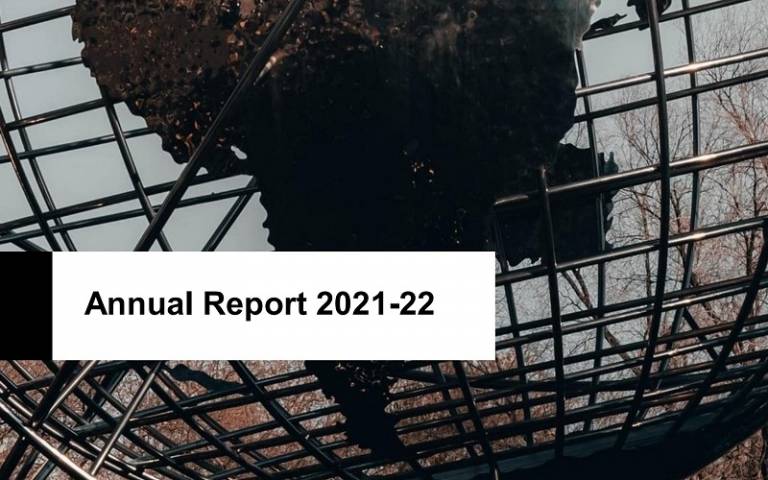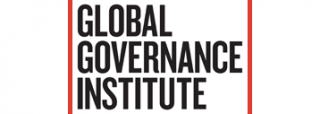GGI Annual Report 2021-2022
3 October 2022
How can we make sense of the complex, compounding challenges facing the world and chart a workable course forward? This is the overarching question the GGI continued to grapple with in 2021-2022.

Global governance appears to be stumbling from crisis to crisis. With the world still reeling from the Covid-19 pandemic, the ongoing war in Ukraine presents new escalating challenges as it puts additional strain on overstretched humanitarian relief efforts, disrupts critical supply chains, and further destabilises an already precarious global security order. Meanwhile, recent heatwaves and intensifying extreme weather events around the world serve as a sobering reminder of our collective failure to respond effectively to the unfolding climate and nature emergency. We now have less than eight years left before 2030, the year by which global leaders have pledged to achieve the Sustainable Development Goals (SDGs) and fully align climate action with the goals of the Paris Agreement. It is more critical than ever that governance efforts on all scales use disruptive events as a lever for systemic change – rather than an excuse to revert to business-as-usual – whilst also building up resilience in the face of an increasingly uncertain future.
How can we make sense of these complex, compounding challenges and chart a workable course forward? This is the overarching question the UCL Global Governance Institute (GGI) continued to grapple with in 2021-22. In collaboration with our partners at UCL and beyond, we have advanced our core mission to provide in-depth, cross-disciplinary research and public outreach activities on a wide range of global challenges.
We are particularly keen to involve students and young people in these efforts, given that they will be disproportionately affected by policy decisions in many areas of global governance. Unfortunately, as former Irish President and prominent human rights advocate Mary Robinson observed at a recent GGI event, genuine intergenerational exchange in global governance is still a rare occurrence: “We should no longer be considering young people as an optional extra in decision making, nor should we see intergenerational dialogue as a box ticking exercise.” This sentiment was echoed by a diverse group of youth climate leaders who joined us for a student-led workshop, where they shared their personal experiences with trying to shape global climate negotiations and canvassed opportunities for broader and more meaningful youth engagement.
We were also delighted to co-host the first Youth Global Governance Forum at UCL. The event, which was organised by the student-led Global Governance and Ethics (GGE) Society and supported by the Dean’s Strategic Funds, aimed at introducing A-level and undergraduate students to the field of global governance and providing a platform for young people to share their experiences and perspectives on the most pressing global challenges. As participating students highlighted, the provision of inclusive, high-quality education on these challenges is vital to enhancing the agency of young people, who often feel overwhelmed, ignored and discouraged in the face of growing complexity and intensifying global crises. The event, which featured lively discussions in small breakout groups as well as interactive debate with UCL academics, was a great showcase for the value of engaging young people in the activities of the university and it is hoped that it will become an annual fixture.
Student engagement has also been an opportunity for us to gain fresh perspectives on the broad range of complex sustainability challenges we currently face. At the end of this academic year, we invited a cross-faculty group of UCL students to join us for a future scenario and ‘backcasting’ exercise, designed to disrupt familiar thinking patterns and gauge the potential for transformative change. We asked participating students to imagine a utopian economic system – one that is environmentally and socially sustainable and does not rely on GDP growth – and then work backwards from this imagined future, charting a pathway of fictional events that produced system change. While it was not easy to shed chronological thinking patterns, the exercise turned out to be highly engaging and thought-provoking. Above all, as one of the participating students reflected, it highlighted “the value of creative collaboration. Backcasting flips teleology on its head, uncovering radical possibilities within global governance and beyond.”
Beyond amplifying the voices of young people, the GGI has continued to promote wider public debate on the most pressing global governance challenges of our times. In 2021-22, our busy events programme tackled a range of urgent issues, including food governance, international security, the energy transition, the future of our economic system, the rise of China, the transformation of civic rebellion, and the changing architecture of global governance. We were fortunate to be joined by many prominent scholars, policy experts and public figures, among them Mary Robinson, Professor Jeffrey Sachs, Professor Michael Barnett, Professor Mark Beissinger, Professor Henrietta Moore and Professor Paul Ekins, to name but a few. Events were largely held online not just as a Covid-19 safety precaution but also to put into action our pledge to include more non-European speakers in our roster of activities, as well as to bring these events to the much expanded global audience the Institute has built during the pandemic. In addition to our events programme, the GGI’s podcast, co-hosted by (current and former) MSc Global Governance and Ethics students, has proven increasingly popular. Over the past 12 months, the podcast aired a total of 15 episodes, featuring in-depth conversations with leading academics and cutting-edge thinkers.
In fulfilling its core mission, the GGI has continued to bolster collaborations with a range of UCL-based, national and international partners. In 2021-22, the GGI team delivered its final contributions to the EU Horizon 2020 funded GLOBE project (“Global Governance and the European Union: Future Trends and Scenarios”) in partnership with colleagues from leading research institutions around the world. GGI-led outputs, which focused on climate governance as well as the effectiveness and legitimacy of international organisations, have resulted in several journal publications this year, including in the Journal of European Integration, Business Strategy and the Environment and Global Policy, with other peer-reviewed publications in the works. The GGI has also been an active member of other research and policy networks, including the Jean Monnet Network on EU/China Global Economic Governance, the COP26 Universities Network, and the new UCL Climate Politics Cluster.
The GGI has also launched new collaborations with colleagues from across UCL and beyond, notably Dr Nick Hughes (UCL Institute for Sustainable Resources) and Dr Inken von Borzyskowski (UCL Political Science) – both of whom will join us as Thematic Directors in 2022-23 – as well as Professor Ben Cashore (Lee Kuan Yew School of Public Policy in Singapore). These and other partnerships have been enabled by generous grants from UCL Grand Challenges, UCL Global Engagement, as well as the Bartlett Research Grants Scheme (BRGS) and resulted in research and engagement activities on a range of key topics, including the debate on economic ‘degrowth,’ the need for complex biodiversity governance, and the contributions of participatory democracy to addressing the climate crisis. In addition, departmental cluster funding has been instrumental in allowing the GGI to expand and deepen collaborations with colleagues from the Department of Political Science, for instance through a joint workshop with the Climate Politics Cluster.
We are extremely grateful for the continued support from our current cohort of GGI Thematic Directors – Dr Zeynep Bulutgil and Dr Manuel Vogt (global security), Professor Barnali Choudhury (global justice and ethics), and Dr Julius Mugwagwa (global health) – that we received this year. We would also like to thank the many students across UCL who have contributed to GGI activities by writing commentaries, providing background research, and assisting in the organisation of events, with a special mention to Xuan Zi Han (BSc Philosophy, Politics and Economics) who led on the above-mentioned climate youth event.
The GGI’s mission is closely aligned with all the principal themes of UCL’s 2034 strategy and the thematic priorities of the UCL Grand Challenges programme. As we move into 2022-23, our focus will remain squarely on enabling and promoting high quality cross-disciplinary research and policy-focused debate on global societal problems, including climate change and biodiversity, international security, global health, as well as justice, equality and human rights. We look forward to pursuing novel opportunities for knowledge cocreation over the next academic year, leveraging UCL’s unique global position and collaborative spirit.
 Close
Close


